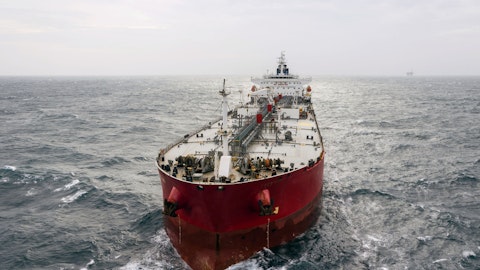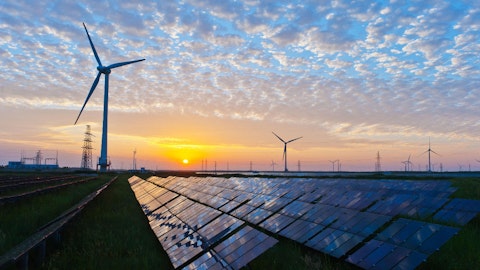Chris Robertson: I just wanted to talk about the dividend for a moment, not as it stands today, but maybe in the future. And Lars, you talked about maybe a stronger for longer scenario here with rate strengths. So, I’m just curious on with 80% of adjusted net income for the dividend for 3Q, how should we think about that going forward as we get closer to maybe 2030 as there’s maybe more technological clarity around future fuels, things like that? Would there be a change so that you could have more cash on hand as dry powder for either pursuing additional growth opportunities or pursuing a fleet renewal in the future?
Lars Barstad: Well, it’s a good question. I think if you point to history, Frontline has had a tendency to actually pay out dividends, and then you use other means of financing in order to finance, for instance, investments in new tonnage and so forth. The only times where we have kind of kept back from paying a handsome dividend has been in a situation where it’s been clearly that the markets have changed fundamentally. So, I don’t know if that kind of answers your question fully. I would like to say though that 80% of net income is in line with what the Frontline historically pays when we make money. It’s our key ambition to give our investors more or less directly the cash we make. So, I think that’s the normal conduct of business.
Chris Robertson: Yes. That’s fair. I guess just as a follow-up, I think that’s a $1 million question, as you mentioned, is what will the market fundamentally be different as we approach 2030 as compared to today? Because it seems like there’s quite a few years runway here with the current order book and everything else going on. But then, once we get closer to the end of the decade, that’s kind of the question I was trying to get at is how different is that market?
Lars Barstad: I’m sorry, Chris, but it’s a very good question, and you call it $1 million question. I wish I could answer it. At Frontline, we tend to be late adopters when it comes to kind of new technology, new fuels. We will always try and position ourselves towards kind of regulatory change and so forth and execute best practice as far as we can. The jury is still out. Most of our tonnage is deep ocean kind of long traveling ships. And as it stands right now, there isn’t really an alternative energy source for these ships. It could be that if gas prices or LNG prices drop significantly, the econs of LNG propulsion could come back to compete. But it’s kind of difficult to envision it. But I think with putting the long sum, you have to keep in mind that at least the kits are going to be more expensive as we proceed, basically, because you need to make investments to reduce your carbon footprint, so.
But I don’t even dare trying to put some numbers on that or apart from kind of the general direction that — but in all fairness, we have actually reduced quite a bit of — and we are kind of every year now committed to follow kind of regulatory demands to reducing our emissions. And we will do so. But obviously, at a certain point of time, the ships – can’t really go any further.
Chris Robertson: Yes. Thanks for indulging the scenario and walking us through that. It’s great color. I’ll turn it over. Thanks.
Operator: Thank you. And your next question comes from the line of Greg Lewis from BTIG. Please go ahead.





